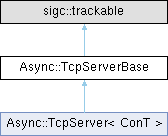The base class for creating a TCP server. More...
#include <AsyncTcpServerBase.h>

Public Member Functions | |
| TcpServerBase (const std::string &port_str, const Async::IpAddress &bind_ip) | |
| Default constuctor. | |
| virtual | ~TcpServerBase (void) |
| Destructor. | |
| int | numberOfClients (void) |
| Get the number of clients that is connected to the server. | |
| TcpConnection * | getClient (unsigned int index) |
| Get the client object pointer from the server. | |
| int | writeAll (const void *buf, int count) |
| Write data to all connected clients. | |
| int | writeOnly (TcpConnection *con, const void *buf, int count) |
| Send data only to the given client. | |
| int | writeExcept (TcpConnection *con, const void *buf, int count) |
| Send data to all connected clients except the given client. | |
| void | setSslContext (SslContext &ctx) |
| Set the SSL context for all new connections. | |
| void | setConnectionThrottling (unsigned bucket_max, float bucket_inc, int inc_interval_ms) |
| Enable connection throttling. | |
Protected Member Functions | |
| virtual void | createConnection (int sock, const IpAddress &remote_addr, uint16_t remote_port)=0 |
| void | addConnection (TcpConnection *con) |
| void | removeConnection (TcpConnection *con) |
| virtual void | emitClientConnected (TcpConnection *con)=0 |
Detailed Description
The base class for creating a TCP server.
- Date
- 2003-12-07
Definition at line 115 of file AsyncTcpServerBase.h.
Constructor & Destructor Documentation
◆ TcpServerBase()
| Async::TcpServerBase::TcpServerBase | ( | const std::string & | port_str, |
| const Async::IpAddress & | bind_ip ) |
Default constuctor.
- Parameters
-
port_str A port number or service name to listen to bind_ip The IP to bind the server to
◆ ~TcpServerBase()
|
virtual |
Destructor.
Member Function Documentation
◆ addConnection()
|
protected |
Referenced by Async::TcpServer< ConT >::createConnection().
◆ createConnection()
|
protectedpure virtual |
Implemented in Async::TcpServer< ConT >.
◆ emitClientConnected()
|
protectedpure virtual |
Implemented in Async::TcpServer< ConT >.
◆ getClient()
| TcpConnection * Async::TcpServerBase::getClient | ( | unsigned int | index | ) |
Get the client object pointer from the server.
- Parameters
-
index The wanted client by number 0 - numberOfClients()-1
- Returns
- The TcpConnection pointer to the client (zero if not found)
Referenced by Async::TcpServer< ConT >::getClient().
◆ numberOfClients()
| int Async::TcpServerBase::numberOfClients | ( | void | ) |
Get the number of clients that is connected to the server.
- Returns
- The number of connected clients
- Examples
- AsyncFramedTcpServer_demo.cpp, and AsyncTcpServer_demo.cpp.
◆ removeConnection()
|
protected |
◆ setConnectionThrottling()
| void Async::TcpServerBase::setConnectionThrottling | ( | unsigned | bucket_max, |
| float | bucket_inc, | ||
| int | inc_interval_ms ) |
Enable connection throttling.
- Parameters
-
bucket_max The size of the bucket bucket_inc How much to add to the bucket on each tick inc_interval_ms How often, in milliseconds, to apply bucket_inc
Use this function to put a limit on the connection rate for each IP address. The "token bucket" algorithm is used to throttle connection flooding. The connection will be accepted but the communication will be blocked until a token is available in the bucket.
Example: bucket_max=5, bucket_inc=0.1, inc_interval_ms=1000 With those settings five connections from an IP will be accepted without delay. Each second (1000ms) the bucket for the IP will be filled with 0.1 tokens so it will take ten seconds until another connection will be allowed to communicate. If no additional connections for the IP are initiated, the bucket will fill to five tokens again efter 50 seconds and we are back to where we started.
◆ setSslContext()
| void Async::TcpServerBase::setSslContext | ( | SslContext & | ctx | ) |
Set the SSL context for all new connections.
- Parameters
-
ctx The SSL context to set
Call this function to set an SSL context that is applied automatically for all client connections. If this is set up in the server all that need to be done, in a client connection after it is established, is to enable SSL by calling enableSsl() on the connection object.
NOTE: The context object is neither copied nor managed by this class so it must be persisted by the caller for as long as this class or any connections live. It is also the responsibility for the caller to delete the context object when it fills no purpose anymore.
◆ writeAll()
| int Async::TcpServerBase::writeAll | ( | const void * | buf, |
| int | count ) |
Write data to all connected clients.
- Parameters
-
buf The data buffer count The number of bytes in the data buffer
- Returns
- The number of bytes sent
- Examples
- AsyncTcpServer_demo.cpp.
◆ writeExcept()
| int Async::TcpServerBase::writeExcept | ( | TcpConnection * | con, |
| const void * | buf, | ||
| int | count ) |
Send data to all connected clients except the given client.
- Parameters
-
con The TcpConnection object not to send to buf The data buffer count The number of bytes in the data buffer
- Returns
- The number of bytes sent
- Examples
- AsyncTcpServer_demo.cpp.
◆ writeOnly()
| int Async::TcpServerBase::writeOnly | ( | TcpConnection * | con, |
| const void * | buf, | ||
| int | count ) |
Send data only to the given client.
- Parameters
-
con The TcpConnection object to send to buf The data buffer count The number of bytes in data buffer
- Returns
- The number of bytes sent
- Examples
- AsyncTcpServer_demo.cpp.
The documentation for this class was generated from the following file:
Generated on Sun May 4 2025 14:24:10 for Async by